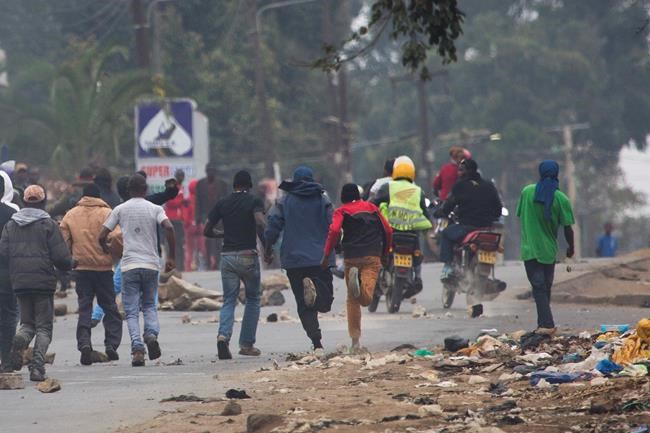
The opposition has published its own figures, putting Mr Odinga ahead of incumbent President Uhuru Kenyatta.
This contrasts with provisional electronic results giving Mr Kenyatta a clear lead in Tuesday’s poll.
Electoral commission chairman Wafula Chebukati told the BBC it was the only body legally allowed to count votes.
He accused the opposition coalition of basic mathematical errors.
International observers have described the election as free and fair.
However, many fear a repeat of the violence after the disputed election 10 years ago when more than 1,100 Kenyans died and 600,000 were displaced.
On Thursday, scores of people took to the streets of Mathare, a slum in the capital Nairobi, shouting “Uhuru must go”.
Mr Chebukati said that the documents containing the real results were still being sent from constituencies to their national tallying centre.
Mr Odinga has said the IT system of the electoral commission had been hacked and Kenya was witnessing the worst “voter theft” in its history.
But the commission said that while there had been an attempt to hack its system, it had failed.
The final outcome should be announced later on Friday.
African observers described Tuesday’s poll as credible, while former US Secretary of State John Kerry said its integrity remained intact.
The European Union said candidates should accept losing as “natural”.
Mr Kerry, who is heading the Carter Center’s observer team, urged all sides to wait for the final results, and for the loser to accept defeat.
He said there were some “minor variances” but none that had so far made him doubt the poll’s integrity.
The “bottom line” was that the electoral commission had in place a “transparent process of voting, counting, reporting and securing the vote”, Mr Kerry added at a press conference in Nairobi.
Commonwealth observer mission head and Ghana’s ex-President John Mahama said there was no reason to doubt the commission’s ability to deliver a “credible election”.
Raw polling data published on the IEBC’s website says that with almost all of results in, Mr Kenyatta – who is seeking a second term – is leading with about 54.3%, to Mr Odinga’s 44.8% share of the vote.
These suggest Mr Kenyatta is heading for a first-round victory.
Kenya’s election in numbers:
- Six separate ballot papers: For president, national assembly, female representatives, governors, senate and county assemblies
- 47 parliamentary seats and 16 senate seats reserved for women
- Eight presidential candidates: President Uhuru Kenyatta and opposition leader Raila Odinga are favourites
- Kenyatta beat Odinga in 2013 – their fathers were also political rivals in the 1960s
- A candidate needs 50% plus one vote for first-round victory
- More than 14,000 candidates running across the six elections
- More than 45% of registered voters under 35
- Some 180,000 security officers on duty nationwide in case of trouble
Source: BBC


